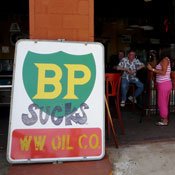Wednesday, May 12, 2010
Pensacola Beach is packed. People sunbathe on the white sand, parents look on as their children make sand castles and run into ankle-deep water, and surfers take full advantage of the waves in the crystal blue water. No one appears concerned about the possibility of the oil spill in the Gulf of Mexico making landfall on the beach, but the spill is very much on peoples' minds.
Jason Clemons, 34, and Truman Fouroux, 48, sit on a ledge near bars and restaurants on Casino Beach playing guitar and drums, respectively. Neither is from Pensacola originally, but both are regulars at the beach and have lived in Pensacola for decades.
"I've got the oil spill blues. Don't you know we're all gonna lose?" Clemons sings passionately, exemplifying the feeling of dread on the beach.
"I work on the beach, and I'm afraid I'll lose my job," Clemons says. Hours have already been cut at the recently opened restaurant where he works. "I think BP should take their profits and pay me off if I lose my job, and clean the beach, and that we should switch to more natural resources."
Michael Randolph, 23, sits next to Clemons and occasionally sings along. Randolph and his family moved to Pensacola Beach from Hattiesburg nine months ago. "It was a huge sacrifice to move here, us not being very wealthy and all. We're here and now we can't go anywhere else," Randolph says. "If the oil spill hits, jobs will be lost; peoples' paradises will be lost."
Aside from job loss, native beachgoers also worry about the possible effect the oil spill will have on beach tourism, one of the leading sources of income for the region.
"I hope they get it cleaned up real quick," says Javarris Brown, 31, of Pensacola. "We need tourists. Without tourists, we have no money."
Beth Schachner, 49, owns Pensacola Beach Properties, a rental and real estate agency. She remains optimistic, although she speaks with a hint of caution in her voice.
"I think the best thing to do is to keep a positive attitude and encourage people who love Pensacola Beach and the Gulf Coast to support us, and come whether we have oil on our beach or not," she says.
Cindy Fink, her three children and granddaughter came to the beach because of the looming oil spill, wanting to enjoy it as much as they can before it hits.
Fink's infant granddaughter drops a cracker in the sand, then eats it. "You won't be able to do that much longer," says one of Fink's daughters under her breath.
They sit on the shore at 18th Avenue, a hotspot for surfers. Fink, 50, remarks that two of her daughters are surfers and are concerned about what will happen to the water.
"I still think we should drill: we just need to be really safe," Fink says. "I really am afraid (the oil spill is) going to change the beaches for decades. I'm just hoping some miracle will happen."
Jem Sullivan, 55, and Tom Hutson, 53, grew up together and have surfed together for about 35 years. "It's scary and unfortunate," Hutson says.
"If there's any kind of positive feeling, is that it seems like the slick is backing up, at least for the time being," Sullivan adds. "It's similar to the feeling before a hurricane. It's nice outside, you can't imagine it, and you can't do anything about it. Like when Ivan hit, you didn't realize how life would change."
Swinson Schipman, 71, is a Pensacola native and has been a commercial and sport fisherman for the past 60 years. He currently works on a charter boat in the Gulf.
"Any predictions made about the oil spill are strictly speculation. We know it's coming up in three places, we know they've been unsuccessful in shutting it off. But we don't know how long it will last," he says. "The factors that determine the way oil will flow, ocean currents, winds and the consistency of oil that's coming up, are virtually unpredictable."
Schipman says the effects of the oil spill will be absolutely devastating.
"It will kill bottom growth, and on the surface it will kill birds, mammals, reptiles and fish," Schipman says. "Oil kills sea grass and vegetation on shore and (in) the estuaries, which are nurseries for virtually all sea life. If you destroy the nursery, you destroy the possibility to reproduce."

Comments
Use the comment form below to begin a discussion about this content.
Sign in to comment
Or login with:
OpenID